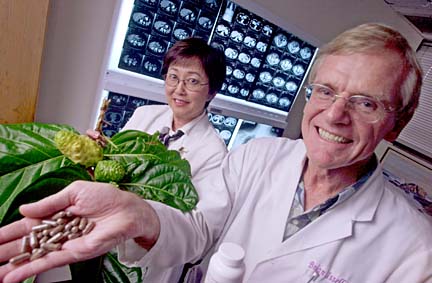
RICHARD WALKER / RWALKER@STARBULLETIN.COM
Noni is extracted from the Indian mulberry plant, held by clinical research nurse Faith Inoshita, left. Groups of patients are taking freeze-dried extract of ripe noni in capsules under a study being conducted by Dr. Brian Issell, right, Inoshita and Dr. Carolyn Gotay at the University of Hawaii's Cancer Research Center.
Noni’s medical worth
being testedEarly results of a study show
promise, but more drug interaction
tests are in the works
A Participant in a Cancer Research Center of Hawaii study to determine if noni will benefit cancer patients thinks an extract from the fruit is helping her.
But while the first phase of the study is encouraging, it is too soon to conclude whether noni is beneficial, said principal investigator Dr. Brian Issell.
Issell is conducting the study -- the first looking at effects of noni in humans -- to determine if noni does what it is purported to do in worldwide promotion of health products, where it is touted as helping a divergent range of illnesses.
There is no scientific evidence of benefits or adverse effects of noni, extracted from the Indian mulberry plant, Issell said. "We really need to find out if noni helps more than harms people with different illnesses."
Dolores DeSoto, 70, of Aiea, is one of about 30 patients in the study with advanced cancer for which no standard treatment is available.
Groups of five patients are taking different doses of freeze-dried extract of ripe noni in capsules. Doses are being increased to find one that will provide the most benefit to patients with the least toxicity or side effects, Issell said. The patients began with two capsules twice a day and have escalated to five capsules four times a day.
"Some patients say they're feeling a little queasy, but we haven't seen anything to make us concerned that noni is going to harm anyone," Issell said.
DeSoto is taking three capsules four times a day. "I have nothing to lose," she said. She was diagnosed with stomach cancer in April 2001, and half of her stomach was removed.
About five months later, another mass was found near her liver. She had a series of chemotherapy and radiation treatments which were not working.
She joined the study, thinking, "If I can help somebody else, that would be great."
She has had no adverse symptoms, and her doctor says CT scans show her cancer has stabilized, she said. "If it's growing, it's just a millimeter."
He thinks noni is helping, she said, "and I'm beginning to believe in it. But I believe in prayers also." She said she is back to housework, cooking and "everything I used to do."
Issell, clinical sciences program director at the University of Hawaii cancer center, is working on the study with researcher Dr. Carolyn Gotay and Faith Inoshita, a clinical research nurse.
"We're looking for an effect related to the dose," Issell said. "We're seeing something, but we don't know what it is yet."
If the National Institutes of Health renews his two-year grant when it runs out in July, he said he will continue increasing capsules until patients are taking 32 a day.
This is not unusual with experimental treatments, he said.
Issell said he became interested in measuring how people feel and function with noni because some of his cancer patients said it made them feel better.
The center also gets an "incredible amount" of inquiries about noni, used in traditional healing by native Hawaiians, other Pacific islanders and Asian populations, he said.
Tahitian noni, one of many products marketed as a "healthy beverage," is a $2 billion industry with no proof that it has any benefits, he said.
Besides studying the tolerance, results and potential toxicities of different doses of noni, the researchers are looking at how it may interact with other drugs patients are taking.
They are analyzing how the plant's different ingredients are absorbed and excreted, and they are trying to identify all its chemicals. "I thought we'd better do the whole thing because we don't want to miss something important," Issell said.
Associate specialist Adrian Franke heads a team, with research associate Laurie Custer, that analyzes blood and urine samples from participants and measures the chemical ingredients.
Their goal is to identify any chemicals that could be used to indicate if an active ingredient is getting into the blood, Issell said. Then they could standardize preparation of noni food supplements, he added.
Inoshita said they are not only looking at anti-tumor properties, but monitoring participants' quality of life to see whether noni relieves fatigue, pain and other cancer symptoms.
She said the researchers get anecdotal information from people that noni reduces arthritic pain and cholesterol and boosts energy, but these are isolated results.
Issell said a lot of people put ripe noni fruit, which looks like a small breadfruit, in a jar and drink it when it liquefies in three to five days. But fermentation changes the product, resulting in a different chemical profile, he noted.
Issell said noni tastes like rancid cheese. He said a friend liquefies the fruit for a boost on hiking trips, but Issell can hardly stand the smell in the car.
DeSoto said she had heard about noni from people who "drink it for blood pressure or for this or for that. I drank it once way back when. Ooh, no way!"
DeSoto said she has no aftertaste from the capsule, which has an extract from Big Island fruit.
Issell said the extract contains "everything in the fruit and seeds. Nothing is strained off. We have to show purity, no contaminants."
In the future, he said, the researchers want to identify how patients metabolize drugs differently. Hawaii's population also offers a unique opportunity to see if different ethnic groups respond to noni in different ways, he said.
